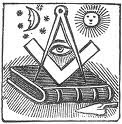Monday, June 14, 2010
Masonry’s Secret Ballot
After a man has applied for Masonic membership, and after his background has been thoroughly investigated, the lodge members vote by secret ballot to accept or to reject him for membership.
Masonry’s secret ballot is another of its ancient landmarks. It has been rather aptly said that when a petitioner is voted upon for Masonic membership he undergoes the ”Ordeal of the Secret Ballot.” To be elected he must receive an affirmative vote from each and every member present at that meeting. Just one member out of all present – there could be twenty, or fifty, or a hundred members in attendance – can drop the black ball and deny him membership. When you consider the moral yardstick by which Masons measure membership applicants, and when you consider that only one member voting negatively can reject a petitioner, it would seem reasonable to assume that a large proportion of petitioners would be rejected for membership. But that is not the case. Many, many more are elected than are rejected. That fact is testimony to the generally good judgment of those who recommend applicants, and it also indicates the fraternity, by and large, attracts more good men than otherwise.
Much has been said and written, pro and con, concerning the unanimously favorable secret ballot. Some argue, not without logic, that it is not fair for just one member out of all those who may be present for a meeting to be able to deny a petitioner membership. Others argue, also logically, that if even one member knows something about a petitioner that convinces him the man’s election would not be in the best interest of Freemasonry, then that one member should have the right and the opportunity to prevent the entrance into Freemasonry of one he feels would bring discredit to it.
It goes without saying that the secret ballot is occasionally abused by a member who rejects a petitioner for mere petty reasons having nothing to do with moral fitness, but such instances are rare and in almost every election the good man is elected to membership.
It is also undeniable that despite the requirements as to recommendation, as to background investigation, and as to unanimous secret ballot, an occasional undesirable person attains Masonic membership. Again, though, these instances are relatively rare. Further, election to Masonic membership is not for perpetuity. Should a member ever act contrary to the requirements of Freemasonry he can be suspended or expelled from membership.
In summary, it can be said the secret ballot has served the fraternity well over the centuries and liberalization of this requirement is not probable. The man who has been rejected for Masonic membership is not thereby forever barred. He can repetition after the passage of a stipulated waiting period which varies from state to state. Some of the most prominent Masons in the history of the fraternity were rejected one or more times before finally gaining acceptance.
Subscribe to:
Post Comments (Atom)



No comments:
Post a Comment